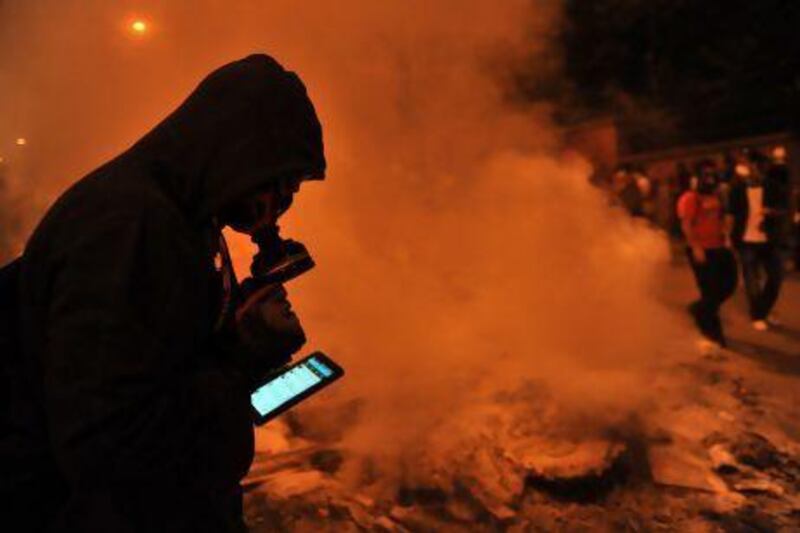ISTANBUL // Recep Tayyip Erdogan, Turkey's prime minister, calls Twitter a "curse" and a source of disinformation about the current unrest in the country. But that does not keep him from tweeting almost daily messages to his 2.8 million followers.
Mr Erdogan's two-track public-relations strategy is an unspoken recognition of the power of social media and the internet in the wave of anti-government protests that have rocked Turkey in the past week. The demonstrations, sparked by a violent police operation to end a sit-in in a park in downtown Istanbul, have left two people dead and led to the arrest of more than 1,700 people across the country.
Millions of people across Turkey have turned to social media to get a picture of the fiercest anti-government protests since Mr Erdogan came to power ten years ago, while activists have used them to exchange information about marches and police movements.
There were at least two million tweets related to the protests in Turkey between last Friday afternoon and early Saturday, with 90 per cent of tweets coming from within the country itself, acccording to the Social Media and Political Participation Lab at New York University, which monitors Twitter use.
"The social media response to and the role of social media in the protests has been phenomenal," Lab members Pablo Barbera and Megan Metzger wrote last Saturday.
In the hands of protesters, the social media have proved - at least in the government's view - a subversive tool.
Police in the western city of Izmir detained 29 people accused of spreading calls for an uprising via Twitter, news reports said yesterday.
Imdat Atas, a lawyer in Izmir, told the online edition of the Hurriyet newspaper that some tweets deemed inflammatory by authorities contained warnings from activists about the location of police squads in the streets of Izmir during a recent night of unrest there.
It is as a source of more general information, however, that social media has had the greatest impact during Turkey's current upheaval.
The country's mainstream media, especially the most watched television news channels, have been accused of displaying a servile attitude towards the government by under-reporting the street protests when they first erupted.
Twitter, Facebook and some previously little-known media like the Halk TV channel, have become for many Turks indispensable in filling the vacuum.
"That will teach a lesson to the normal media," said Ferhat Kentel, a sociologist at Istanbul's Sehir University. "I don't think they will be able to go on like before."
NTV, a respected news channel owned by the Dogus group, which recently won a government tender to develop a port in Istanbul, apologised for failing to covering the unrest adequately.
"The criticism is correct to a large extent," Cem Aydin, head of Dogus Medya Group, which includes NTV, said in a statement posted in the channel's website.
But Mr Kentel, the sociologist, warned that failure of the established media to satisfactorily cover the current unrest did not represent an unqualified victory for social media.
"There is good and bad here," he told The National. "Social media can be used for greater transparency, but they can also be used to spread lies or propaganda, and the user does not have any guarantees."
He was referring to news reports saying that some pictures on social media that supposedly showed police violence in Turkey turned out to be photos of police action in Italy.
"The unrest has shown the power and the limits of power of social media at the same time," Mr Kentel said.
The purported limits of social media are of little significance to the embattled Mr Erdogan.
He told the Haberturk news channel last weekend that social media were used to "terrorise" people.
"There is this curse called Twitter," Mr Erdogan said. "The worst of lies and exaggeration are found here. The way I see it, this thing called social media is society's biggest curse."
As an example for what he meant, the prime minister said pictures of people allegedly killed in the unrest had been published on Twitter at a time when no one had died yet.
At the same time, authorities acknowledged that social media could help to clear up accusations of illegal police methods in trying to quell the unrest.
Muammer Guler, the interior minister, told parliament that pictures from Twitter and other social media would be used to investigate police officers accused of mistreating demonstrators.
Mr Erdogan's government has been accused by critics of using its power to put pressure and to intimidate on the media.
RTUK, the state's media watchdog issued a warning on Monday to Halk TV for airing a music video critical of Mr Erdogan, according to the Anadolu news agency.
Banu Guven, a former NTV anchor who left the channel two years ago after her superiors vetoed a planned interview with a Kurdish politician, said the the prime minister's duration in power has only increased that vulnerability.
"In recent years, they have increasingly become the voice of Recep Tayyip Erdogan," she told The National. "The more money they have, the more they are afraid" to anger the government.
tseibert@thenational.ae






